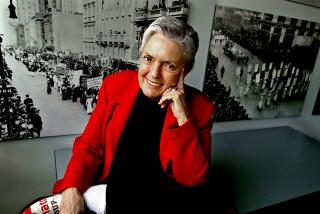When one person takes a stand, a lot of people will follow . . .
- Share via
Dorothy Golden was proud when they put the story of her fight for gasohol in the Congressional Record in 1980. She has grown accustomed to bouquets for her work in community organizations and her outspoken support of consumers. But when it all started in Pittsburgh, Golden was an activist only for her husband. She and her husband, Al, an ex-playwright and retired insurance company executive and marketing consultant, live in Burbank. They have been married 53 years.
The first time Al ever took any notice of me was in a little-theater group in Pittsburgh. It was the beginning of the season, and the director got up and said, “This year we’re going to do such and such, and we’re going to produce this or that.” And a little voice from the audience spoke up, “But you said that last year.” Al said, “Who is that little aggressive thing?” It was me.
Al and I got together as friends and eventually got married. I became his agent and his typist and whatever he needed so he could go ahead and concentrate on his writing. He was recognized as the genius of Pittsburgh. He was the up-and-coming playwright. To be selected by him to be married to him was a big, big thing.
Al had been in prisons as a criminologist, and from the experience he wrote a sensational play called “The Female of the Species,” based on the first woman in Pennsylvania to be condemned to the electric chair.
I brought in the very famous Judith Anderson to play the lead. On opening night she brought the house down.
Eventually I went to New York and got two producers to produce the play on Broadway. I was in my 20s, and I was scared. I believed that this was a terrific play, or I couldn’t have done it. I stayed at some third-rate hotel, and I sold it in one week.
When we first started out, I thought it was going to be a cinch. We planned to get Al’s plays produced and to get him out of the rat race and commercialism so he could do that and nothing else. But that business is very disheartening. You can work your heart out, and in one night you can lose the whole thing. You thought that once you wrote a play and got reviews that it would just continue on better and better. But it doesn’t always work that way.
Until recent years I was a shadow behind Al. I typed his scripts. I sold his scripts. Everything was to further his career, whether it was writing or mass marketing or whatever. Suddenly I find myself an individual in my own right. I can get up and give a speech at the temple, and people later will say, “I knew you would be here, so I came.”
I feel that one person can make a difference. We learned that in the National Council of Jewish Women. We did make a difference in some areas. I was one woman who took a stand on therapeutic abortion, where somebody else would just say, “Well, I guess it’s just hopeless.” I was able to persuade a whole council of thousands of women to take a stand with me. When one person takes a stand, a lot of people will follow, whereas they would never do it on their own.
Right now I think there is an element of young people who are so busy trying to be wealthy that they aren’t interested in causes. There still must be some who are, but I haven’t been talking to them.
I just can’t sit back and watch things go by. I just wish I had more energy and more health, and maybe I could do more. I feel that when something has to be done or something has to be said, get up and have the strength to say it.
I think retirement for some people is very difficult. When you’ve had a career like Al’s, not one but two at a time sometimes, and you’ve reached the point where you’ve been a real big shot executive and had a whole slew of people working for you, to suddenly be cut off from that, it becomes very difficult for him.
So what is he doing? He’s becoming the executive at 217 South Rose. But here he doesn’t push a button. He knows that if anything needs to be done, he just puts it on Dorothy’s desk.
More to Read
The biggest entertainment stories
Get our big stories about Hollywood, film, television, music, arts, culture and more right in your inbox as soon as they publish.
You may occasionally receive promotional content from the Los Angeles Times.










